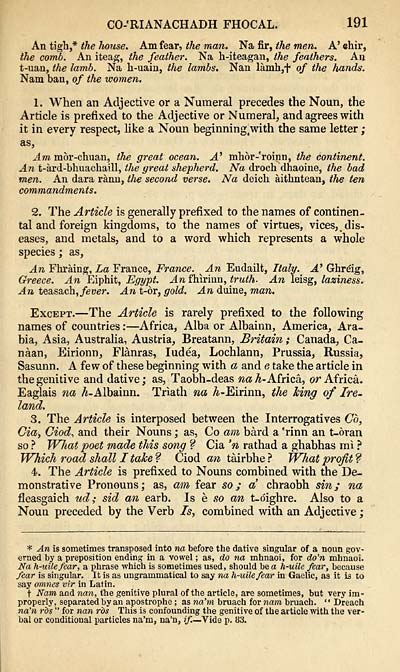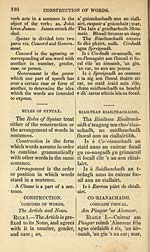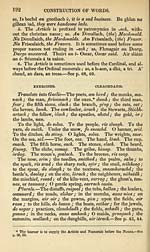Books and other items printed in Gaelic from 1841 to 1870 > Stéidhean a' Ghràmair Ghaëlig
(219) Page 191
Download files
Complete book:
Individual page:
Thumbnail gallery: Grid view | List view

CO-RIANACHADH FHOCAL.
191
An tigh,* the house. Am fear, the man. Na fir, the men. A' ehìr,
the comb. An iteag, the feather. Na h-iteagan, the feathers. An
t-uan, the lamb. Na h-uain, the lambs. Nan làmh,+ of the hands.
Nam ban, of the women.
1. When an Adjective or a Nuraeral precedes the Noun, the
Article is preflxed to the Adjective or Numeral, and agrees with
it in every respect, like a Noun beginning a with the same letter ;
as,
Am mòr-chuan, the great ocean. A' mhòr- roinn, the continent.
An t-àrd-bhuachaill, the great shepherd. Na droch dhaoine, the bad
men. An dara rànn, the second verse. Na deich àithntean, the ten
commandments.
2. The Article is generally prefixed to the names of continen-
tal and foreign kingdoms, to the names of virtues, vices,.dis-
eases, and metals, and to a word which represents a whole
species ; as,
An Fhràing, La France, France. An Eudailt, Italy. A' Ghreig,
Greece. An Eiphit, Egypt. An fhìrinn, truth. An leisg, laziness.
An teasach, fever. An t-òr, gold. An duine, man.
Except. — The Article is rarely prefixed to the following
names of countries : — Africa, Alba or Albainn, America, Ara-
bia, Asia, Australia, Austria, Breatann, Britain ; Canada, Ca-
nàan, Eirionn, Flànras, Iudèa, Lochlann, Prussia, Russia,
Sasunn. A few of these beginning with a and e take the article in
thegenitive and dative; as, Taobh-deas na h-Aùica, or Africà.
Eaglais na A-Albainn. Trìath na A-Eirinn, the hing of Ire-
land.
3. The Article is interposed between the Interrogatives Gò,
Gia, Giod, and their Nouns ; as, Co am bàrd a 'rinn an t-òran
so ? What poet made this song ? Cia 'n rathad a ghabhas mì ?
Which road shall I take ? Ciod an tàirbhe ? What prqfit ?
4. The Article is prefixed to Nouns combined with the De-
monstrative Pronouns ; as, am fear so ; a' chraobh sin ; na
fleasgaich ud; sid an earb. Is è so an t-dighre. Also to a
Noun preceded by the Verb Is, combined with an Adjective ;
* An is sometimes transposed into na before the dative singular of a noun gov-
erned by a preposition ending in a vowel ; as, do na mhnaoi, for do'n mhnaoi.
Na h-uilefear, a phrase which is sometimes used, should be a h-uile fear, because
fear is singular. It is as ungrammatical to say na h-uilefear in Gaelic, as it is to
say omnes vir in Latin.
t Nam and nan, the genitive plural of the article, are sometimes, but very im-
properly, separated by an apostrophe ; as na'm bruach for nam bruach. " Dreach
na'n rds " for nan ròs This is confounding the genitive of the avticle with the ver-
bal or conditional particles na'm, na'n, if,— Vide p. 83.
191
An tigh,* the house. Am fear, the man. Na fir, the men. A' ehìr,
the comb. An iteag, the feather. Na h-iteagan, the feathers. An
t-uan, the lamb. Na h-uain, the lambs. Nan làmh,+ of the hands.
Nam ban, of the women.
1. When an Adjective or a Nuraeral precedes the Noun, the
Article is preflxed to the Adjective or Numeral, and agrees with
it in every respect, like a Noun beginning a with the same letter ;
as,
Am mòr-chuan, the great ocean. A' mhòr- roinn, the continent.
An t-àrd-bhuachaill, the great shepherd. Na droch dhaoine, the bad
men. An dara rànn, the second verse. Na deich àithntean, the ten
commandments.
2. The Article is generally prefixed to the names of continen-
tal and foreign kingdoms, to the names of virtues, vices,.dis-
eases, and metals, and to a word which represents a whole
species ; as,
An Fhràing, La France, France. An Eudailt, Italy. A' Ghreig,
Greece. An Eiphit, Egypt. An fhìrinn, truth. An leisg, laziness.
An teasach, fever. An t-òr, gold. An duine, man.
Except. — The Article is rarely prefixed to the following
names of countries : — Africa, Alba or Albainn, America, Ara-
bia, Asia, Australia, Austria, Breatann, Britain ; Canada, Ca-
nàan, Eirionn, Flànras, Iudèa, Lochlann, Prussia, Russia,
Sasunn. A few of these beginning with a and e take the article in
thegenitive and dative; as, Taobh-deas na h-Aùica, or Africà.
Eaglais na A-Albainn. Trìath na A-Eirinn, the hing of Ire-
land.
3. The Article is interposed between the Interrogatives Gò,
Gia, Giod, and their Nouns ; as, Co am bàrd a 'rinn an t-òran
so ? What poet made this song ? Cia 'n rathad a ghabhas mì ?
Which road shall I take ? Ciod an tàirbhe ? What prqfit ?
4. The Article is prefixed to Nouns combined with the De-
monstrative Pronouns ; as, am fear so ; a' chraobh sin ; na
fleasgaich ud; sid an earb. Is è so an t-dighre. Also to a
Noun preceded by the Verb Is, combined with an Adjective ;
* An is sometimes transposed into na before the dative singular of a noun gov-
erned by a preposition ending in a vowel ; as, do na mhnaoi, for do'n mhnaoi.
Na h-uilefear, a phrase which is sometimes used, should be a h-uile fear, because
fear is singular. It is as ungrammatical to say na h-uilefear in Gaelic, as it is to
say omnes vir in Latin.
t Nam and nan, the genitive plural of the article, are sometimes, but very im-
properly, separated by an apostrophe ; as na'm bruach for nam bruach. " Dreach
na'n rds " for nan ròs This is confounding the genitive of the avticle with the ver-
bal or conditional particles na'm, na'n, if,— Vide p. 83.
Set display mode to:
![]() Universal Viewer |
Universal Viewer | ![]() Mirador |
Large image | Transcription
Mirador |
Large image | Transcription
Images and transcriptions on this page, including medium image downloads, may be used under the Creative Commons Attribution 4.0 International Licence unless otherwise stated. ![]()
| Rare items in Gaelic > Books and other items printed in Gaelic from 1841 to 1870 > Stéidhean a' Ghràmair Ghaëlig > (219) Page 191 |
|---|
| Permanent URL | https://digital.nls.uk/101714227 |
|---|
| Description | Out-of-copyright books printed in Gaelic between 1631 and 1900. Also some pamphlets and chapbooks. Includes poetry and songs, religious books such as catechisms and hymns, and different editions of the Bible and the Psalms. Also includes the second book ever published in Gaelic in 1631. |
|---|

